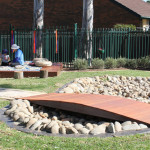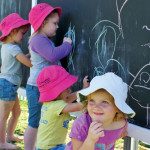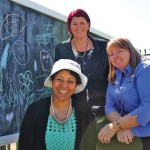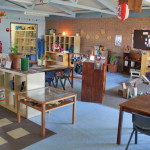Rattler sees advocacy in action at Amarina Early Learning Centre in Airds, a disadvantaged south-western suburb of Sydney on the cusp of rapid change. The service is operated by Campbelltown City Council—a local government that understands how early education can transform communities and children’s futures. Ingrid Maack reports.
(This article first appeared in Rattler 108, published by Community Child Care Co-operative (NSW). To purchase a copy, go to: www.ccccnsw.org.au/shop)
Just 50 minutes from Sydney’s CBD, Campbelltown is home to 150,000 residents. This Local Government Area is home to a very young population with a high number of sole parent and low-income families. It is also home to some of the state’s most vulnerable children.
According to a Campbelltown City Council report*, one in five children under 15 years in Campbelltown live in a jobless household, compared to about one in 14 across Sydney.
In the suburb of Airds alone, there is 27.3 per cent unemployment. Airds is a public housing estate built by the NSW Government in the 1970s—a social experiment that created pockets of serious urban poverty. This was due to lack of infrastructure and access to public transport and a consequent lack of social mobility.
However, Airds is marked for redevelopment as a sustainable mixed-income community. The proposed Airds Bradbury Renewal Project aims to help break cycles of poverty over the coming 15 to 20 years. It will involve transforming the area from 94 per cent public housing to only 30 per cent.
And at the centre of this community is Campbelltown City Council’s Amarina Early Learning Centre, where there are 46 enrolled children, 40 of whom receive full CCB rates. It is a place where local families access many specialist services and is clearly a thriving hub for this community.
Educators and children recently staged an impromptu talent show called Amarina’s Got Talent. Using its new wooden outdoor stage, some sang Twinkle, Twinkle Little Star, while other children sat at a ‘judging table’ drawing on paper.
The performance was a fitting celebration of the recently renovated yard, which Amarina educational leader Kathy Roberts and Manager Education and Care Services Justine Uluibau proudly show off. The yard hadn’t been touched for 20 years and was pretty run down but today it has an outdoor stage, a large rock garden and wooden bridge, a brand new sandpit, raised garden beds and a popular outdoor blackboard mounted on the perimeter fence.
The renovation of the outdoor environment involved input from parents, educators and children.
‘One of the children’s suggestions was for a small exercise trampoline to be built into the ground. It is one of the children’s favourite experiences,’ Ms Roberts says.
‘You can imagine the learning opportunities that occurred during the renovation when, for example, the children saw how concrete was mixed or when the stage area was being built.’
Children reportedly have a greater sense of belonging to the new outdoor environment, particularly as many children live in small townhouses and do not typically have access to large outdoor spaces at home.
As well as a room leader, Amarina also has an outdoor leader, a nominated staff member whose role it is to champion sustainability within the service, set up and plan the outdoor program and encourage all of the team to take pride in the outdoor environment. This is Danielle Johnston, who regularly joins leaders from other Council services to share ideas and information as part of an outdoor leader’s group.
‘We often go on road trips to meet other educators and observe other services to gain ideas and network,’ says Ms Uluibau.
‘We are strong advocates within the local government sector, meeting regularly with other managers, coordinators and teams. This allows us to continually benchmark best practice.’
As we tour the grounds, I spot a pink sequined scarecrow in the vegetable garden, which I am told the children constructed with an old plastic Christmas tree, stockings, a wig and a pink cowboy hat. It is perhaps the most delightful scarecrow I have ever seen!
‘When we made our scarecrow, one of the children said: “She should be on Australia’s Got Talent”,’ enthuses Ms Roberts.
It becomes increasingly clear that indeed Amarina’s got talent. Last year it won an ECEEN (Sprouts Award) for its initiative on saving energy.
The service went to great efforts to reduce energy consumption through using natural light, turning off appliances when not required, minimising use of the clothes dryer and providing ongoing education to children and families on sustainability.
‘We want the children to see recycling, water and energy saving, taking care and having respect for our environment as part of their day-to-day practices.
‘About four years ago we scaled back on all the bright colours, introduced more natural resources and switched the lights off. Overhead fluorescent lights can be overbearing. Last year we introduced soft glowing salt lamps into our rooms which apparently have a calming effect and aid concentration.’
More importantly, Amarina is also one of two Campbelltown Council education and care services that achieved an Exceeding rating this year, with Amarina Exceeding in six out of seven quality areas.
‘We are currently putting together applications for an Excellent Rating for both services,’ explains Ms Uluibau. (The only other services to achieve this honour so far have been in South Australia and Queensland.)
* Since going to print, Amarina Early Learning Centre received an Excellent Rating, the first service in NSW to receive the honour.
Inside, there is a large wall display with the words ‘We Value your Contribution’ and a series of photos of children interacting with visiting parents. It is a powerful message to the community that they are always welcome at the service.
‘We have many non-working families and sole parents here,’ says Ms Roberts. ‘We provide a place where parents and carers can come and have a cup of coffee and chat with the supervisor or the educators.
‘The centre is an extension of the child’s family, so it’s important parents and educators work together to provide the best outcomes for children,’ says Ms Roberts, explaining their strong focus on family involvement.
‘We want to provide an environment where parents can come to the centre to learn about child development and learn why play is important.
‘Our 3–5 room engages in “family interaction time”. Families book in a time to spend at the centre doing an activity in which they feel comfortable. This may be reading a book, making play dough or constructing in the block corner.
‘Photos of the families interacting with the children are then displayed on the wall and the children constantly comment on them and say, “That’s my dad” or “Look, my mum’s helping garden”.
‘A great sense of belonging has been achieved as a result of this project,’ says Ms Roberts.
Campbelltown City Council also has a Partnerships in Early Childhood Program (PECP) together with the Benevolent Society. The program acknowledges the important role that education and care services have in the lives of families and the role it can play in breaking cycles of poverty.
I meet Candice Peroumal, who is a Child and Family Worker (CFW) employed by the Benevolent Society that visits Amarina four days week. Her role is to help families and communities develop stronger, healthier relationships using the attachment theory model.
She also provides parenting advice, support to educators in identifying the meaning behind children’s behaviour, referrals and information regarding specialist support and community development.
‘Campbelltown City Council is the only council in NSW that is working in partnership with the Benevolent Society with this program, and we are fortunate to be involved’, says Ms Uluibau. (The program is funded by the Australian Government and is evaluated every three years.)
Partnerships in practice at Child and Family Centre
Right next door to Amarina Early Learning Centre is the Campbelltown Child and Family Centre. Funded by the Department of Education and Communities and managed by Campbelltown Council, it offers a PEPPS Supported Playgroup three days a week and access to a family outreach worker, who works with families in crisis with referrals to other agencies and specialist services.
Peta Keating is an early childhood trained playgroup coordinator who has worked at the Children and Family Centre for 13 years.
‘Here we really encourage the parents to play with the children, engage in conversation and build those bonds. We work with all family members and carers—parents, grandparents and foster parents,’ she says.
Parents can access child development support from qualified staff at the centre as well as high quality resources for free.
The service offers a supported school holiday program for children. School holidays are on the day I visit and I have the privilege of briefly meeting several families who use the service, before they embark on a group excursion to a local park for a picnic.
Kerry Ellis, who is joined by two of her sons Riley (five) and Jayden (10), has been coming to the centre for 14 years. ‘All my boys have come to playgroup here. I actually live right next door so it’s like a home away from home for us.
‘I’ve been coming since before you were born,’ she says to her boys.
I also chat with Rebecca Giddio as she sits and draws a picture of a penguin with her daughter Charlotte (five). ‘I’ve been coming 11 years. I’m practically a veteran,’ she jokes, explaining that all four of her children have attended the playgroup.
‘When I moved to Campbelltown 11 years ago, the midwives told me about the playgroup so I started coming as I knew no-one in the area. I have made good friends and got lots of support here,’ she explains. ‘I’m illiterate. I had a brain injury when I was five and nearly drowned. Peta [the playgroup’s coordinator] has helped me with my reading and also coaching my kids so they are ready for school.’
Rebecca and Charlotte have both clearly benefitted from the Campbelltown Child and Family Centre and Uniting Care Burnside’s ‘Books for Airds’ literacy initiative, in which each family received eight free books. ‘I only have a low reading level but Peta has been great at explaining milestones to me so I know my kids are on-track. Charlotte, my youngest, is off to school next year!’
*Campbelltown City Council Report: Revised Campbelltown Social Plan 2010–2012.









No Comments Yet